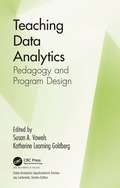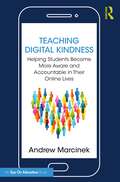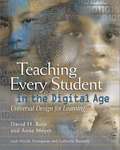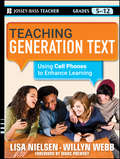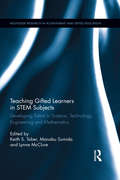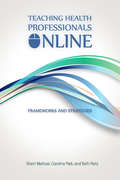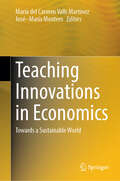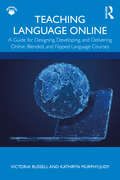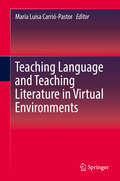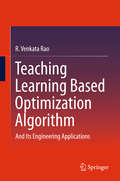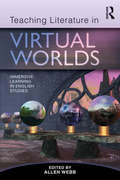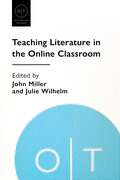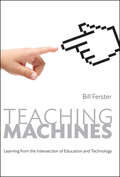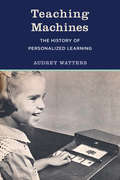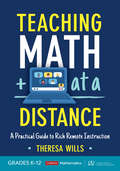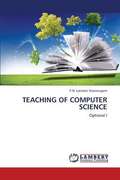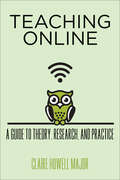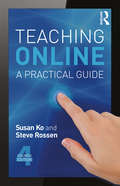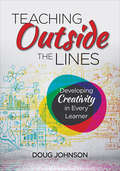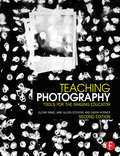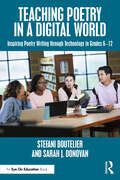- Table View
- List View
Teaching Data Analytics: Pedagogy and Program Design (Data Analytics Applications)
by Susan A Vowels Katherine Leaming GoldbergThe need for analytics skills is a source of the burgeoning growth in the number of analytics and decision science programs in higher education developed to feed the need for capable employees in this area. The very size and continuing growth of this need means that there is still space for new program development. Schools wishing to pursue business analytics programs intentionally assess the maturity level of their programs and take steps to close the gap. Teaching Data Analytics: Pedagogy and Program Design is a reference for faculty and administrators seeking direction about adding or enhancing analytics offerings at their institutions. It provides guidance by examining best practices from the perspectives of faculty and practitioners. By emphasizing the connection of data analytics to organizational success, it reviews the position of analytics and decision science programs in higher education, and to review the critical connection between this area of study and career opportunities. The book features: A variety of perspectives ranging from the scholarly theoretical to the practitioner applied An in-depth look into a wide breadth of skills from closely technology-focused to robustly soft human connection skills Resources for existing faculty to acquire and maintain additional analytics-relevant skills that can enrich their current course offerings. Acknowledging the dichotomy between data analytics and data science, this book emphasizes data analytics rather than data science, although the book does touch upon the data science realm. Starting with industry perspectives, the book covers the applied world of data analytics, covering necessary skills and applications, as well as developing compelling visualizations. It then dives into pedagogical and program design approaches in data analytics education and concludes with ideas for program design tactics. This reference is a launching point for discussions about how to connect industry’s need for skilled data analysts to higher education’s need to design a rigorous curriculum that promotes student critical thinking, communication, and ethical skills. It also provides insight into adding new elements to existing data analytics courses and for taking the next step in adding data analytics offerings, whether it be incorporating additional analytics assignments into existing courses, offering one course designed for undergraduates, or an integrated program designed for graduate students.
Teaching Digital Kindness: Helping Students Become More Aware and Accountable in Their Online Lives
by Andrew MarcinekDigital tools have a clear educational purpose, but how do we help students with the darker corners of the web? This book provides timely, much-needed advice for educators on how to teach students to handle the anger and divisiveness that pervades social media and that is impossible to ignore when using tech for other purposes. Author Andrew Marcinek provides strategies we can use to help students with issues such as navigating relationships; understanding digital ethics and norms; returning to a balance with screen time; reclaiming conversation; holding yourself accountable; creating a new digital mindset; and more. Throughout, there are practical features such as Pause and Reflects, Teachable Moments, and classroom activities and lesson plans, so you can easily implement the ideas across content areas and grade levels.
Teaching Every Student in the Digital Age: Universal Design for Learning
by David Rose Anne MeyerThis book presents principles and applications of Universal Design for Learning (UDL), a research-based framework for responding to individual learning differences and a blueprint for the modern redesign of education. Early chapters lay out the foundation of UDL, describing neuroscience research on learning differences, the uses of digital media in the classroom, and the creation of flexible curricula. Later chapters show how to set appropriate goals for each student, how to choose methods and materials, and how to assess students' progress. The authors are cofounders and codirectors of the Center for Applied Special Technology. Annotation c. Book News, Inc. , Portland, OR (booknews. com)
Teaching Generation Text
by Lisa Nielsen Willyn WebbMobilizing the power of cell phones to maximize students' learning power Teaching Generation Text shows how teachers can turn cell phones into an educational opportunity instead of an annoying distraction. With a host of innovative ideas, activities, lessons, and strategies, Nielsen and Webb offer a unique way to use students' preferred method of communication in the classroom. Cell phones can remind students to study, serve as a way to take notes, provide instant, on-demand answers and research, be a great vehicle for home-school connection, and record and capture oral reports or responses to polls and quizzes, all of which can be used to enhance lesson plans and increase motivation. Offers tactics for teachers to help their students integrate digital technology with their studies Filled with research-based ideas and strategies for using a cell phone to enhance learning Provides methods for incorporating cell phones into instruction with a unit planning guide and lesson plan ideas This innovative new book is filled with new ideas for engaging learners in fun, free, and easy ways using nothing more than a basic, text-enabled cell phone.
Teaching Gifted Learners in STEM Subjects: Developing Talent in Science, Technology, Engineering and Mathematics (Routledge Research in Achievement and Gifted Education)
by Keith S. Taber Manabu Sumida Lynne McClureThis book offers an overview of programmes designed to support the learning of gifted and talented students in STEM subjects, both to allow them to meet their potential and to encourage them to proceed towards careers in STEM areas. The chapters from a range of national contexts report on perspectives, approaches and projects in gifted education in STEM subjects. These contributions provide a picture of the state of research and practice in this area, both to inform further research and development, and to support classroom teachers in their day-to-day work. Chapters have been written with practitioners in mind, but include relevant scholarly citations to the literature. The book includes some contributions illustrating research and practice in specific STEM areas, and others which bridge across different STEM subjects. The volume also includes an introductory theoretical chapter exploring the implications for gifted learners of how 'STEM' is understood and organized within the school curriculums.
Teaching Health Professionals Online: Frameworks and Strategies
by Beth Perry Sherri Melrose Caroline ParkTeaching Health Professionals Online: Frameworks and Strategies is a must-read for professionals in the health care field who strive to deliver excellence in their online classes. Intended for a wide range of professionals, including nurses, social workers, occupational and radiation therapists, chiropractors, dietitians, and dental hygienists, this compendium of teaching strategies will inspire both new and experienced instructors in the health professions. In addition to outlining creative, challenging activities with step-by-step directions and explanations of why they work, each chapter in the text situates practice within the context of contemporary educational theories such as instructional immediacy, invitational theory, constructivism, connectivism, transformative learning, and quantum learning theory. Melrose, Park, and Perry also address other issues familiar to those who have taught online courses. How can a distance instructor build teacher-student relationships? How does one transform the assumptions often held by students in the health fields from the confines of the virtual classroom? Most importantly, how can the instructor support his or her students in their future pursuits of knowledge and their development as competent professionals? By considering these and other concerns, this handbook aims to help instructors increase student success and satisfaction, which, the authors hope, will ultimately produce the best possible patient care.
Teaching Innovations in Economics: Towards a Sustainable World
by José–María Montero María del Carmen Valls MartínezThis book highlights the latest technological innovations in economics education. Economics, as a discipline, not only studies the relationship between ends and scarce means, which can be used alternatively, but also serves as a social science that uses historical data to predict future events—a task complicated by the influence of human behavior. In economics, a solid theoretical foundation alone is insufficient; practical application requires a deep understanding of statistics. With the vast amount of information available today, data processing is now performed using specialized software. Consequently, teaching economics demands a wide range of complex skills that have significantly evolved in recent years, driven by the growing interest in educational innovation among professors and scientists, further accelerated by advancements in new technologies. Moreover, economics education is increasingly aligned with the global concern for sustainability, as emphasized in the United Nations' Agenda 2030. Professors are now integrating sustainability into syllabi and teaching methodologies. This book covers key topics such as: Technological and innovative advancements in economics education. New teaching-learning theories and models in economics education. The impact of digital transformation on economics education. The role of artificial intelligence in economics education. Addressing special educational needs in economics education. Evaluation of the teaching-learning process in economics. Assessment of student learning in economics. Development of materials and tools for economics education. Final projects (Undergraduate and Master's) in economics. Authored by leading professors and researchers in the field, this book presents a collection of chapters that rigorously explore teaching innovations in economics.
Teaching Language Online: A Guide for Designing, Developing, and Delivering Online, Blended, and Flipped Language Courses
by Victoria Russell Kathryn Murphy-JudyPractical and accessible, this book comprehensively covers everything you need to know to design, develop, and deliver successful online, blended, and flipped language courses. Grounded in the principles of instructional design and communicative language teaching, this book serves as a compendium of best practices, research, and strategies for creating learner-centered online language instruction that builds students’ proficiency within meaningful cultural contexts. This book addresses important topics such as finding and optimizing online resources and materials, learner engagement, teacher and student satisfaction and connectedness, professional development, and online language assessment. Teaching Language Online features: A step-by-step guide aligned with the American Council on the Teaching of Foreign Languages (ACTFL), the Common European Framework of Reference (CEFR) for Languages: Learning, Teaching and Assessment, and the World-Class Instructional Design and Assessment (WIDA) standards Research-based best practices and tools to implement effective communicative language teaching (CLT) online Strategies and practices that apply equally to world languages and ESL/EFL contexts Key takeaway summaries, discussion questions, and suggestions for further reading in every chapter Free, downloadable eResources with further readings and more materials available at www.routledge.com/ 9781138387003 As the demand for language courses in online or blended formats grows, K-16 instructors urgently need resources to effectively transition their teaching online. Designed to help world language instructors, professors, and K-12 language educators regardless of their level of experience with online learning, this book walks through the steps to move from the traditional classroom format to effective, successful online teaching environments.
Teaching Language and Teaching Literature in Virtual Environments
by María Luisa Carrió-PastorThis book sheds new light on language and literature teaching, and offers examples of teaching language in virtual environments. Providing an overview of virtual environments for teaching, it also includes chapters devoted to methodology design for second language teaching in these environments. Further it describes tools for second/ foreign language teaching and proposals for specific second language teaching in virtual environments. Lastly, it presents experiments on literature teaching in virtual environments and discusses the future of technology in education. With interdisciplinary appeal, the book is a particularly valuable resource for scholars with an interest in technology, language teaching and literature teaching.
Teaching Learning Based Optimization Algorithm
by R. Venkata RaoDescribing a newoptimization algorithm, the "Teaching-Learning-Based Optimization (TLBO)," in aclear and lucid style, this book maximizes reader insights into how the TLBOalgorithm can be used to solve continuous and discrete optimization problemsinvolving single or multiple objectives. As the algorithm operateson the principle of teaching and learning, where teachers influence the qualityof learners' results, the elitist version of TLBOalgorithm (ETLBO) is described along with applications of the TLBO algorithm inthe fields of electrical engineering, mechanical design, thermal engineering,manufacturing engineering, civil engineering, structural engineering, computerengineering, electronics engineering, physics and biotechnology. The book offers a valuableresource for scientists, engineers and practitioners involved in thedevelopment and usage of advanced optimization algorithms.
Teaching Literature in Virtual Worlds: Immersive Learning in English Studies
by Allen WebbWhat are the realities and possibilities of utilizing on-line virtual worlds as teaching tools for specific literary works? Through engaging and surprising stories from classrooms where virtual worlds are in use, this book invites readers to understand and participate in this emerging and valuable pedagogy. It examines the experience of high school and college literature teachers involved in a pioneering project to develop virtual worlds for literary study, detailing how they created, utilized, and researched different immersive and interactive virtual reality environments to support the teaching of a wide range of literary works. Readers see how students role-play as literary characters, extending and altering character conduct in purposeful ways ,and how they explore on-line, interactive literature maps, museums, archives, and game worlds to analyze the impact of historical and cultural setting, language, and dialogue on literary characters and events. This book breaks exciting ground, offering insights, pedagogical suggestions, and ways for readers to consider the future of this innovative approach to teaching literary texts.
Teaching Literature in the Online Classroom (Options for Teaching #59)
by John Miller and Julie WilhelmThis volume considers the challenges and opportunities of online literature classes and suggests instructional strategies that ensure students are engaged in the virtual classroom. The ideas shared here are grounded in research, practice, critical self-reflection, and collaboration. Reflecting a diverse collection of practical tips and experiences from colleagues teaching at a variety of institutions, the essays offer readers the chance to inhabit others' classrooms. Contributors discuss building an interactive and inclusive classroom and using hypertext, video lectures, and other asynchronous and synchronous tools in classes whose subjects include, among others, Shakespeare, the Chinese novel, early American literature, speculative fiction, and contemporary American poetry.
Teaching Machines: Learning from the Intersection of Education and Technology (Tech.edu: A Hopkins Series on Education and Technology)
by Bill FersterTechnology promises to make learning better, cheaper, faster—but rarely has it kept that promise.The allure of educational technology is easy to understand. Classroom instruction is an expensive and time-consuming process fraught with contradictory theories and frustratingly uneven results. Educators, inspired by machines’ contributions to modern life, have been using technology to facilitate teaching for centuries.In Teaching Machines, Bill Ferster examines past attempts to automate instruction from the earliest use of the postal service for distance education to the current maelstrom surrounding Massive Open Online Courses. He tells the stories of the entrepreneurs and visionaries who, beginning in the colonial era, developed and promoted various instructional technologies. Ferster touches on a wide range of attempts to enhance the classroom experience with machines, from hornbooks, the Chautauqua movement, and correspondence courses to B. F. Skinner’s teaching machine, intelligent tutoring systems, and eLearning. The famed progressive teachers, researchers, and administrators that the book highlights often overcame substantial hurdles to implement their ideas, but not all of them succeeded in improving the quality of education. Teaching Machines provides invaluable new insight into our current debate over the efficacy of educational technology.
Teaching Machines: The History of Personalized Learning
by Audrey WattersHow ed tech was born: Twentieth-century teaching machines--from Sidney Pressey's mechanized test-giver to B. F. Skinner's behaviorist bell-ringing box.Contrary to popular belief, ed tech did not begin with videos on the internet. The idea of technology that would allow students to "go at their own pace" did not originate in Silicon Valley. In Teaching Machines, education writer Audrey Watters offers a lively history of predigital educational technology, from Sidney Pressey's mechanized positive-reinforcement provider to B. F. Skinner's behaviorist bell-ringing box. Watters shows that these machines and the pedagogy that accompanied them sprang from ideas--bite-sized content, individualized instruction--that had legs and were later picked up by textbook publishers and early advocates for computerized learning. Watters pays particular attention to the role of the media--newspapers, magazines, television, and film--in shaping people's perceptions of teaching machines as well as the psychological theories underpinning them. She considers these machines in the context of education reform, the political reverberations of Sputnik, and the rise of the testing and textbook industries. She chronicles Skinner's attempts to bring his teaching machines to market, culminating in the famous behaviorist's efforts to launch Didak 101, the "pre-verbal" machine that taught spelling. (Alternate names proposed by Skinner include "Autodidak," "Instructomat," and "Autostructor.") Telling these somewhat cautionary tales, Watters challenges what she calls "the teleology of ed tech"--the idea that not only is computerized education inevitable, but technological progress is the sole driver of events.
Teaching Macroeconomics with Microsoft Excel®
by Humberto BarretoHumberto Barreto gives professors a simple way to teach fundamental concepts for any undergraduate macroeconomics course using Microsoft Excel® with Excel workbooks and add-ins and videos freely available on his university website. The Excel files are designed to be used by students with any textbook, and have been used many times by the author in his own teaching. Each Excel workbook contains links to short screencasts, around five to ten minutes, that show the cursor and typing as the file is manipulated with narration that walks the student through the steps needed to complete a task. The book shows professors a simple way to present macroeconomic models and incorporate data into their courses.
Teaching Math at a Distance, Grades K-12: A Practical Guide to Rich Remote Instruction (Corwin Mathematics Series)
by Theresa E. WillsMake Rich Math Instruction Come to Life Online In an age when distance learning has become part of the "new normal," educators know that rich remote math teaching involves more than direct instruction, online videos, and endless practice problems on virtual worksheets. Using both personal experience and those of teachers in real K-12 online classrooms, distance learning mathematics veteran Theresa Wills translates all we know about research-based, equitable, rigorous face-to-face mathematics instruction into an online venue. This powerful guide equips math teachers to: Build students’ agency, identity, and strong math communities Promote mathematical thinking, collaboration, and discourse Incorporate rich mathematics tasks and assign meaningful homework and practice Facilitate engaging online math instruction using virtual manipulatives and other concrete learning tools Recognize and address equity and inclusion challenges associated with distance learning Assess mathematics learning from a distance With examples across the grades, links to tutorials and templates, and space to reflect and plan, Teaching Math at a Distance offers the support, clarity, and inspiration needed to guide teachers through teaching math remotely without sacrificing deep learning and academic growth.
Teaching Math at a Distance, Grades K-12: A Practical Guide to Rich Remote Instruction (Corwin Mathematics Series)
by Theresa E. WillsMake Rich Math Instruction Come to Life Online In an age when distance learning has become part of the "new normal," educators know that rich remote math teaching involves more than direct instruction, online videos, and endless practice problems on virtual worksheets. Using both personal experience and those of teachers in real K-12 online classrooms, distance learning mathematics veteran Theresa Wills translates all we know about research-based, equitable, rigorous face-to-face mathematics instruction into an online venue. This powerful guide equips math teachers to: Build students’ agency, identity, and strong math communities Promote mathematical thinking, collaboration, and discourse Incorporate rich mathematics tasks and assign meaningful homework and practice Facilitate engaging online math instruction using virtual manipulatives and other concrete learning tools Recognize and address equity and inclusion challenges associated with distance learning Assess mathematics learning from a distance With examples across the grades, links to tutorials and templates, and space to reflect and plan, Teaching Math at a Distance offers the support, clarity, and inspiration needed to guide teachers through teaching math remotely without sacrificing deep learning and academic growth.
Teaching Of Computer Science
by P.N. Lakshmi ShanmugamThis book has been written as a basic textbook for B.Ed student teachers who have chosen one of the optional subjects as computer science -I studying in the B.Ed colleges affiliated to Tamil Nadu Teachers Education University. The importance of systematic and organized knowledge can hardly be exaggerated in this book. Ten chapters namely Hardware and Software, Aims of Teaching Computer Science, Micro-teaching, Lesson Plan and Unit Plan, Methods of Teaching. Teaching Aids. Curriculum, Evaluation in Education, Textbook, Assignment and Review are described in a simple language with images and necessary illustrations to enable the student teachers to understand it clearly and easily. It highlights skills and values for everyday use based upon Bloom's taxonomy of educational objectives. A complete and detailed description of computer science library is helpful to the students in stimulating the ideas about digital library. Greater emphasis is given to the use of different types of tests and construction of Achievement test towards the improvement of learning and instruction.
Teaching Of Computer Science
by P.N. Lakshmi ShanmugamThis book has been written as a basic textbook for B.Ed student teachers who have chosen one of the optional subjects as computer science -I studying in the B.Ed colleges affiliated to Tamil Nadu Teachers Education University. The importance of systematic and organized knowledge can hardly be exaggerated in this book. Ten chapters namely Hardware and Software, Aims of Teaching Computer Science, Micro-teaching, Lesson Plan and Unit Plan, Methods of Teaching. Teaching Aids. Curriculum, Evaluation in Education, Textbook, Assignment and Review are described in a simple language with images and necessary illustrations to enable the student teachers to understand it clearly and easily. It highlights skills and values for everyday use based upon Bloom's taxonomy of educational objectives. A complete and detailed description of computer science library is helpful to the students in stimulating the ideas about digital library. Greater emphasis is given to the use of different types of tests and construction of Achievement test towards the improvement of learning and instruction.
Teaching Online: A Guide to Theory, Research, and Practice (Tech.edu: A Hopkins Series on Education and Technology)
by Claire Howell MajorDemystifies online teaching for both enthusiastic and wary educators and helps faculty who teach online do their best work as digital instructors.It is difficult to imagine a college class today that does not include some online component—whether a simple posting of a syllabus to course management software, the use of social media for communication, or a full-blown course offering through a MOOC platform. In Teaching Online, Claire Howell Major describes for college faculty the changes that accompany use of such technologies and offers real-world strategies for surmounting digital teaching challenges.Teaching with these evolving media requires instructors to alter the ways in which they conceive of and do their work, according to Major. They must frequently update their knowledge of learning, teaching, and media, and they need to develop new forms of instruction, revise and reconceptualize classroom materials, and refresh their communication patterns. Faculty teaching online must also reconsider the student experience and determine what changes for students ultimately mean for their own work and for their institutions. Teaching Online presents instructors with a thoughtful synthesis of educational theory, research, and practice as well as a review of strategies for managing the instructional changes involved in teaching online. In addition, this book presents examples of best practices from successful online instructors as well as cutting-edge ideas from leading scholars and educational technologists. Faculty members, researchers, instructional designers, students, administrators, and policy makers who engage with online learning will find this book an invaluable resource.
Teaching Online: A Practical Guide (College Teaching Ser.)
by Susan Ko Steve RossenTeaching Online: A Practical Guide is an accessible, introductory, and comprehensive guide for anyone who teaches online. The fourth edition of this bestselling resource has been fully revised, maintains its reader-friendly tone, and offers exceptional practical advice, new teaching examples, faculty interviews, and an updated resource section. New to this edition: entire new chapter on MOOCs (massive open online courses); expanded information on teaching with mobile devices, using open educational resources, and learning analytics; additional interviews with faculty, case studies, and examples; spotlight on new tools and categories of tools, especially multimedia. Focusing on the "hows" and "whys" of implementation rather than theory, the fourth edition of Teaching Online is a must-have resource for anyone teaching online or thinking about teaching online.
Teaching Outside the Lines: Developing Creativity in Every Learner
by Douglas A. JohnsonMake Creativity The Center Of The Curriculum! In our fast-changing world, the ability to think independently and innovatively is no longer a “nice extra”—it’s a survival skill. This book delivers surefire strategies for equipping learners across all grades and subjects with the motivation and critical thinking skills to thrive in our high-tech future. Content includes: Why “one right answer” instruction paradigms discourage critical thinking and risk-taking Why merely using the latest technology class does not equate to teaching creatively Projects and prompts that ask the question “So what does this mean in the classroom today?”
Teaching Outside the Lines: Developing Creativity in Every Learner
by Douglas A. JohnsonMake Creativity The Center Of The Curriculum! In our fast-changing world, the ability to think independently and innovatively is no longer a “nice extra”—it’s a survival skill. This book delivers surefire strategies for equipping learners across all grades and subjects with the motivation and critical thinking skills to thrive in our high-tech future. Content includes: Why “one right answer” instruction paradigms discourage critical thinking and risk-taking Why merely using the latest technology class does not equate to teaching creatively Projects and prompts that ask the question “So what does this mean in the classroom today?”
Teaching Photography: Tools for the Imaging Educator (Photography Educators Series)
by Glenn Rand Garin Horner Jane Alden StevensThe photographic community is rife with talented and creative practitioners and artists. But making great photographs does not always translate into an ability to teach effectively. This new edition of Teaching Photography approaches photographic education from a point of view that stresses the how and why of the education. It includes the resources that will inspire new and seasoned teachers to help students expand their technical and aesthetic abilities and techniques, as well as their visual literacy and the way photography fits into the wider world. Fully updated to include the online/hybrid classroom environment, collaborative learning, rubrics, and using digital technology, plus techniques for inspiring conversations and critiques.
Teaching Poetry in a Digital World: Inspiring Poetry Writing through Technology in Grades 6-12
by Stefani Boutelier Sarah J. DonovanTeaching Poetry in a Digital World supports English language arts (ELA) educators for grades 6–12 to incorporate digital literacy in their classrooms by teaching the reading and writing of poetry.In an increasingly digital age, educators must adapt to meet the changing needs and interests of their students by incorporating technology into the classroom. This book introduces its audience to the e-Poetry Framework. This framework demonstrates how poetry might present itself in a literacy-based unit with the benefit of a technology medium to share with the world. Examples include teaching zip-ode poetry, incorporating haiku with the creation of GIFs, and ethically discussing AI with nonet poems. With adaptable lesson plans and assessments, as well as educator examples, the book will inspire teachers to create intentional student-centered e-Poetry units.The book is aligned with ELA literacy standards, International Society for Technology in Education (ISTE) educator standards, and National Council of Teachers of English (NCTE)’s position statement for integrating technology into ELA classrooms. It is a key resource for secondary school educators teaching ELA, creative writing, and digital media.
